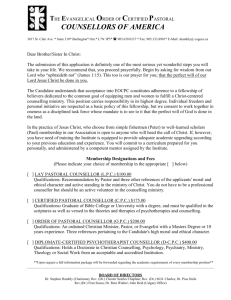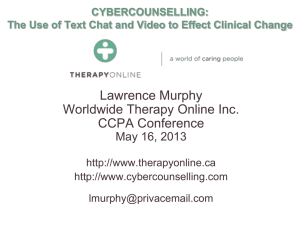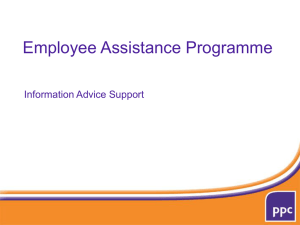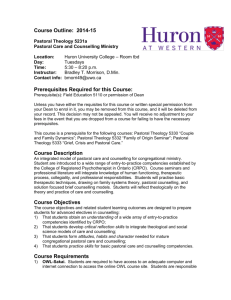C8547 - Sydney College of Divinity
advertisement
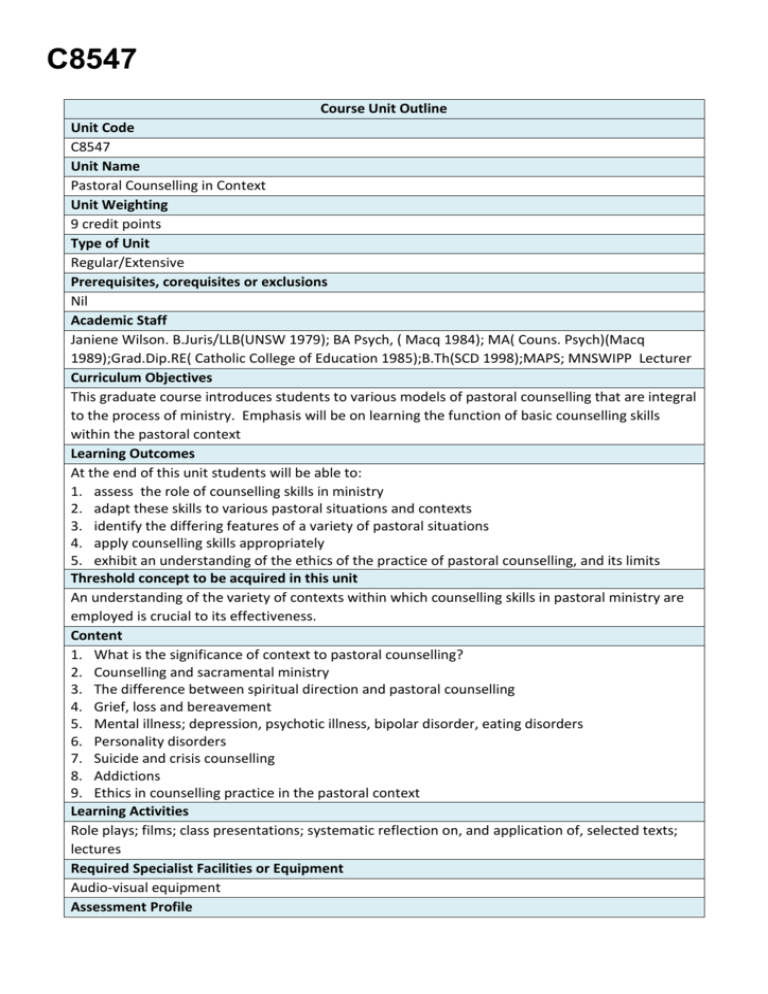
C8547 Course Unit Outline Unit Code C8547 Unit Name Pastoral Counselling in Context Unit Weighting 9 credit points Type of Unit Regular/Extensive Prerequisites, corequisites or exclusions Nil Academic Staff Janiene Wilson. B.Juris/LLB(UNSW 1979); BA Psych, ( Macq 1984); MA( Couns. Psych)(Macq 1989);Grad.Dip.RE( Catholic College of Education 1985);B.Th(SCD 1998);MAPS; MNSWIPP Lecturer Curriculum Objectives This graduate course introduces students to various models of pastoral counselling that are integral to the process of ministry. Emphasis will be on learning the function of basic counselling skills within the pastoral context Learning Outcomes At the end of this unit students will be able to: 1. assess the role of counselling skills in ministry 2. adapt these skills to various pastoral situations and contexts 3. identify the differing features of a variety of pastoral situations 4. apply counselling skills appropriately 5. exhibit an understanding of the ethics of the practice of pastoral counselling, and its limits Threshold concept to be acquired in this unit An understanding of the variety of contexts within which counselling skills in pastoral ministry are employed is crucial to its effectiveness. Content 1. What is the significance of context to pastoral counselling? 2. Counselling and sacramental ministry 3. The difference between spiritual direction and pastoral counselling 4. Grief, loss and bereavement 5. Mental illness; depression, psychotic illness, bipolar disorder, eating disorders 6. Personality disorders 7. Suicide and crisis counselling 8. Addictions 9. Ethics in counselling practice in the pastoral context Learning Activities Role plays; films; class presentations; systematic reflection on, and application of, selected texts; lectures Required Specialist Facilities or Equipment Audio-visual equipment Assessment Profile Assessment tasks are designed to both help students to attain the unit outcomes and to enable teachers to assess student attainment. In this unit, assessment of student achievement with respect to the unit outcomes will be based on: 1. Critical reflection on, and appraisal of, various counselling contexts. (Essay). [Outcomes 1, 2 and 3] 2. Critical application of counselling concepts. (Portfolio of reading summaries). [Outcomes 4 and 5 3. A record of critical reflection upon learning from practical exercises and role plays (weekly portfolio). [Outcomes 1, 2, 3, 4 and 5] Representative References 1. American Psychiatric Association. Diagnostic & Statistical Manual of Mental Disorders. IV-TR. USA, 2000. 2. Browning, Don S. Reviving Christian Humanism: The New Conversation on Spirituality, Theology, and Psychology. Minneapolis, MN: Fortress Press, 2010. 3. Coombs, Robert Holman (Ed). Handbook of Addictive Disorders. Hoboken, N.J.: Wiley Press, USA, 2004. 4. Crowley, Paul G. Unwanted Wisdom. Continuum: New York, 2006. 5. Joyce, Peter R. & Phillip B. Mitchell. Mood Disorders: Recognition & Treatment. Sydney, NSW: UNSW Press, 2004. 6. McLeod, John. An Introduction to Counselling. Buckingham [England]; Bristol, Pa.: Open University Press, UK, 2009. 7. McWilliams, Nancy. Psychoanalytic Diagnosis. 2nd ed. New York: Guilford Press, 2011. 8. May, Gerald G. Addiction & Grace; Love & Spirituality in the Healing of Addictions. San Francisco, CA: Harper One, 2007. 9. Wicks, Robert J., Richard D. Parsons & Donald Capps (Eds). Clinical Handbook Of Pastoral Counseling. New York, NY: Paulist Press, 1993.
